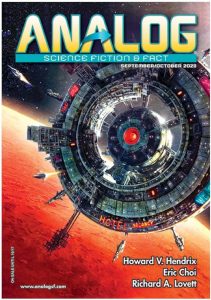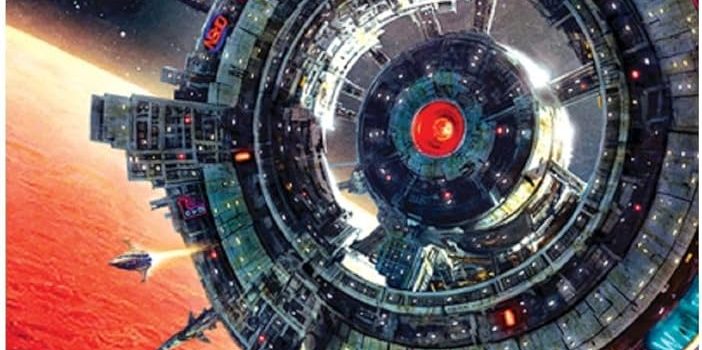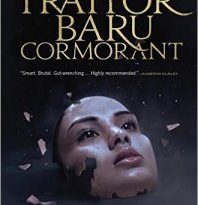A.C. Wise Reviews Short Fiction: Analog, Clarkesworld and Flash Fiction Online
 Analog 9-10/23
Analog 9-10/23
Clarkesworld 10/23
Flash Fiction Online 10/23
Analog’s September/October issue opens with the excellent novelette “The Apotheosis of Krysalice Wilson” by Howard V. Hendrix. Teenage figure skater Krysalice is approached with the opportunity to implant experimental technology that will give her better reaction times and improve her sense of spatial relations – a kind of natural GPS akin to the way birds navigate as they migrate – enhancing her ability to perform, while also testing the implant for future medical applications. Krysalice’s mother and grandfather are hesitant at first, but agree, and after a brief period of adjustment, Krysalice’s skating improves. Soon she reaches the point where it seems she’s operating on multiple levels, carving elaborate floral patterns into the ice as she skates, winning her more and more competitions, and garnering her sponsorships. At the same time, her behavior becomes increasingly erratic, leading her grandfather to suspect her of using the chip more often than she should. When a light accidentally flashes into her eyes during a performance, causing a chip malfunction and seizures, Krysalice believes she’s been deliberately sabotaged, adding paranoia to the other changes in her personality. She runs away from home after a vicious fight with her mother, and her grandfather is the one to find her skating on a frozen lake, where he films her final performance. The story’s denouement is beautifully done, and Hendrix infuses the moment, and the story as a whole, with real emotion. The characters feel believable and fully formed in this bittersweet exploration of the potential benefits and dangers of technology.
Another standout is “Secondhand Music” by Aleksandra Hill, which puts a unique twist on the idea of a haunted or possessed body part affecting the behavior of the person who receives it via transplant – a trope more often seen in horror than science fiction. Hill gives the idea technological spin, exploring similar themes to Hendrix’s story, but from a completely different angle. Ava is a violinist who receives a highly advanced prosthetic arm after an accident. The prosthetic belonged to another violinist named Natsuke, and carries some of her memories. After the transplant, Natsuke’s widow takes an interest in Ava, playing on her sympathies, asking to hear her play privately, then inviting her to a soiree and pushing her to perform publicly before she’s ready. Hill’s writing is lovely, while also conveying subtle tension and a sense of threat from Natsuke’s widow. The story does a wonderful job of drawing on both elements of science fiction and horror, blending them together beautifully. A particularly nice touch, possibly reflective of the blended genres, is that rather than coming from the “haunted” limb, or the ghost of the violinist, the true threat in the story comes from Natsuke’s widow. This gives the story an added air of melancholy and, again, effectively puts a twist on the trope while adding dimension to the characters.
Several of the stories in this issue took a lighter tone, including the tongue-in-cheek “Beware the Glob!” by Eric Choi, which functions as a sequel to the 1958 film The Blob. The story picks up several years after the events of the film, where global warming and dropping temperatures in the Arctic have caused the titular blob to reawaken. A group of scientists is called upon to help stop the creature, but the government grows impatient and decides to implement their own solution, choosing a course of action that “feels like it should work” rather than a plan backed by science and tested for safety. The results are predictably disastrous. The snarky tone works well, and the story is all too plausible in its portrayal of antiscience policy, climate change denial, and racist policymaking.
“The Machine That Is You” by Elliott Gresswell is a flash fiction piece that also takes a lighter tone, while still touching on serious subject matter. An AI bot in a hospital finds creative ways to alert patients to serious medical conditions, even if their insurance doesn’t cover the tests they would need in order to discover said conditions, helping to save their lives. It’s a nice counterbalance to the stories of AI working against humanity, either on purpose or by accident, portraying a helpful AI with more of a conscience and a desire to do no harm to its human counterparts, while also taking on the grim state of the health care system.
The issue contains several more flash fiction pieces, as well as short stories, novelettes, and essays. Several of the works touch on AI and medical technology, but there is a good range of topics and themes explored, including first contact, corporate greed, the search for intelligent life, the mundane dangers or space, genetically enhanced plants, and time machines. Overall, the issue made for a very satisfying read.
The October issue of Clarkesworld includes three novelettes, along with a handful of short stories of varying lengths, the shortest of which kicks off the issue. “Possibly Just About a Couch” by Suzanne Palmer traces the rise and fall of existence itself, from stars coming together, to life forming, to the end of everything, until the cycle starts all over again. And all the while, an ineffable and implacable red couch abides, observing it all, or possibly not observing at all, because after all, it may be just a couch. It’s a nice start to the issue, providing a chill meditation on the nature of existence.
“Down to the Root” by Lisa Papademetriou is a bittersweet story about Luriel, a crew member on a spaceship who forms a friendship with a new co-worker from an isolationist culture that believes in time as a circle and that everyone is literally reborn. After he is killed in an accident, Luriel fights to rescue his body and ultimately bring it back to his home world, so his cycle won’t end. It’s a touching story, and Papademetriou does a nice job of grounding the characters and infusing them with real emotion. “DeProfundis, A Space Love Letter” by Bella Han, like Palmer’s story, is another meditative piece. Originally published in Chinese and translated by the author, it considers – as many other recent stories – the relationship between art and AI, in particular as it relates to storytelling and literature. The descriptions were evocative and the writing lyrical, with sections that were reminiscent of Susannah Clarke’s Piranesi.
Two highlights of the issue were David Goodman’s novelette “Such is My Idea of Happiness” and “Post Hacking for the Uninitiated” by Grace Chan, a story just short of novelette length. Goodman’s story takes place in a cyberpunkesque future London, where protagonist Andrew Ferguson works as an office drone, constantly exhausted, stimming just to get by, and trying to better his situation in life. He hopes to pass an upcoming exam to make it to Grade III. If he does, sleep will become his job, allowing his dreams to be harvested for the Brights – the upper class who have genetically enhanced themselves into perpetual youth, sacrificing the ability to dream and innovate along the way, making them dependent on people like Andrew. Over the course of the story, Andrew comes to realize that the system is rigged against him, designed to keep people like him down and keep the current class system in place. A mysterious woman calling herself Arabella approaches him, showing him there may be a different way to change his situation in life. The slick voice and snappy rhythm of the prose really carry this story, making the world feel lush and lived-in. There is also a certain appeal and relatability in the idea that the character’s goal, and the mark of success in the story’s world, is simply the ability to get a really good sleep.
Chan’s “Post Hacking for the Uninitiated” drops readers right into the action, giving the feel of joining an adventure already in progress. Calam and Orin have just kidnapped Calam’s mother for reasons not specified. Before they can deal with the fallout of that, Orin is attacked, her implants hacked in a way that renders her comatose, throwing her back into her own memories. She just barely manages to tell Calam to get her back to her ship before she’s knocked out. As Calam fights his way back to the ship, Orin relives snippets of her childhood, specifically her father’s cruelty toward her mother. Much like her own implants were hacked, Orin’s father took away her mother’s ability to speak as a form of punishment and control, forcing her to relearn how to communicate. Once back on the ship and plugged into it, Orin wakes and reveals to Calam that the ship is in essence a part of her. It carries a backup of her, and thus recovered, the two head off to the next part of their adventure. Like Goodman’s story, the writing here is sharp and the voice carries the piece. The world and characters have depth and a feeling of lives that extends beyond the page. The glimpses shown of Orin’s memories are particularly poignant and suffused with emotion. As a slice of a larger world, it still feels satisfying, and stands well on its own.
Overall, the stories in the October issue of Clarkesworld deal with a wide variety of themes – from a nostalgic view of Mars, to government oppression building to revolution, to classism in a cyberpunk future, and more. The September issue, reviewed in last month’s column, contained more stories sharing a common thread, explored from different angles. Together, the two issues – and indeed Clarkesworld as a whole – do a wonderful job of showcasing the breadth, depth, and possibility of science fiction storytelling.
The September issue of Flash Fiction Online contains three original stories, one reprint, and an essay on surviving the slush pile, which specifically addresses flash fiction. “Quantum Love” by Sylvia Heike starts the issue off on a high note, showing how effective and poignant flash fiction can be. The story is told from the perspective of a quantum computer that is and isn’t in love with Natalie, the scientist working with it. The computer goes from resenting Natalie’s co-worker Gil, jealous of their closeness, to seeing how that closeness might provide a solution to Natalie’s sadness and exhaustion. According to the computer’s calculations, the odds of Natalie’s marriage crumbling are very high, and so it engineers a reason for her and Gil to spend more time together, nudging them into a relationship that will make them both happy, even though doing so both breaks and doesn’t break the computer’s heart. The story is genuinely sweet and touching, telling a complete story with fully fleshed out characters in just a few hundred words.
“Button Mashing” by Josh Pearce takes the opposite approach, with a tightly focused story exploring a single moment in time, but it’s no less effective. The story manages to be both cute and sensual, as two teenagers play an arcade game as a stand-in for sex. The hormones are palpable, and the scenario plausible as pixels allow the characters to express what they can’t in words, with some great descriptive language to boot. The issue’s reprint story, “Grandma’s Sex Robot” by William Hawkins, like Heike’s story, is also genuinely touching, and presents a complete story with characters that feel fully fleshed out, in just a few hundred words. The titular grandma refuses to be embarrassed by her sex robot and hide it away, much to her family’s chagrin. After her death, however, it becomes clear that their relationship was more than just physical, as the robot continues to act out their lives together, even though she’s gone, giving the story a bittersweet and melancholy air.
Recommended Stories:
‘‘The Apotheosis of Krysalice Wilson’’, Howard V. Hendrix (Analog 9-10/23)
‘‘Secondhand Music’’, Alexsandra Hill (Analog 9-10/23)
‘‘Beware the Glob’’, Eric Choi (Analog 9-10/23)
‘‘Quantum Love’’, Sylvia Heike (Flash Fiction Online 10/23)
‘‘Such is My Idea of Happiness’’, David Goodman (Clarkesworld 10/23)
‘‘Post Hacking for the Uninitiated’’, Grace Chan (Clarkesworld 10/23)
‘‘To Carry You Inside of You’’, Tia Tashiro (Clarkesworld 11/23)
‘‘Bird-Girl Builds a Machine’’, Hannah Yang (Clarkesworld 11/23)
A.C. Wise is the author of the novels Wendy, Darling, and Hooked, along with the recent short story collection, The Ghost Sequences. Her work has won the Sunburst Award for Excellence in Canadian Literature of the Fantastic, and has been a finalist for the Nebula Awards, Stoker, World Fantasy, Locus, British Fantasy, Aurora, Lambda, and Ignyte Awards. In addition to her fiction, she contributes a review column to Apex Magazine.
This review and more like it in the December and January 2023 issue of Locus.
 While you are here, please take a moment to support Locus with a one-time or recurring donation. We rely on reader donations to keep the magazine and site going, and would like to keep the site paywall free, but WE NEED YOUR FINANCIAL SUPPORT to continue quality coverage of the science fiction and fantasy field.
While you are here, please take a moment to support Locus with a one-time or recurring donation. We rely on reader donations to keep the magazine and site going, and would like to keep the site paywall free, but WE NEED YOUR FINANCIAL SUPPORT to continue quality coverage of the science fiction and fantasy field.
©Locus Magazine. Copyrighted material may not be republished without permission of LSFF.








